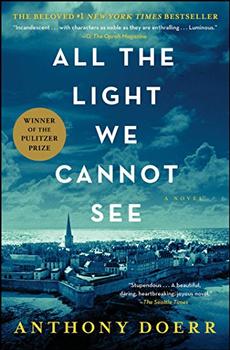Summary | Excerpt | Reading Guide | Reviews | Beyond the Book | Read-Alikes | Genres & Themes | Author Bio

Critics' Opinion:
Readers' Opinion:
First Published:
May 2014, 448 pages
Paperback:
Apr 2017, 544 pages
 Book Reviewed by:
Book Reviewed by:
Naomi Benaron
Buy This Book
Please be aware that this discussion guide will contain spoilers!
Ten years in the writing, Anthony Doerr's All the Light We Cannot See is an epic work of historical fiction. With richly detailed language and characters who are both brave and heartbreaking, Doerr weaves together the stories of a French girl named Marie-Laure who has lost her eyesight and a German orphan named Werner. As Hitler's occupied territory grows, Marie-Laure and Werner's lives and families are torn apart by the war, yet this gorgeous novel is the story of people who, against the odds, find good in one another.
Enhance Your Book Club
To learn more about the Battle of Normandy, find maps, timelines, photographs, and recommendations for films and books on the subject. Visit www.dday-overlord.com/eng/index.htm.
Take another look at Werner's redacted letter to Jutta on page 283. There's so much blacked out that it's hard to take any meaning from his message. What do you imagine he might have been writing about? Try to fill in the blanks with your best guess.
Radio was such an important part of Werner's and Marie-Laure's stories, and WWII in general. Visit the BBC archive collections at www.bbc.co.uk/archive/collections.shtml to listen to clips of Nazi propaganda, news reports, and personal accounts of World War II.
Have you ever read any Jules Verne? Pick up a copy of Twenty Thousand Leagues Under the Sea (or view the 1954 film adaptation) and talk about why you think Anthony Doerr decided to make Verne's fiction such a big part of his own.
Also by Anthony Doerr
The Shell Collector
Four Seasons in Rome
About Grace
Unless otherwise stated, this discussion guide is reprinted with the permission of Scribner. Any page references refer to a USA edition of the book, usually the trade paperback version, and may vary in other editions.





The House on Biscayne Bay
by Chanel Cleeton
As death stalks a gothic mansion in Miami, the lives of two women intertwine as the past and present collide.

The Flower Sisters
by Michelle Collins Anderson
From the new Fannie Flagg of the Ozarks, a richly-woven story of family, forgiveness, and reinvention.

The Funeral Cryer by Wenyan Lu
Debut novelist Wenyan Lu brings us this witty yet profound story about one woman's midlife reawakening in contemporary rural China.
Your guide toexceptional books
BookBrowse seeks out and recommends the best in contemporary fiction and nonfiction—books that not only engage and entertain but also deepen our understanding of ourselves and the world around us.